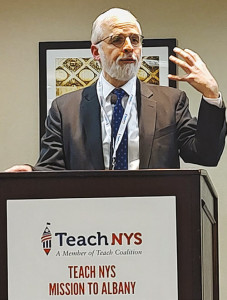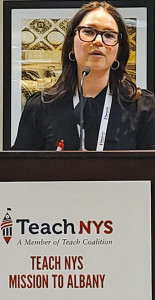
TEACH NYS postponed their lobby day in Albany by one week due to a major snowstorm that hit the Albany area and closed down business at the capital on March 14. The lobby day was supposed to be filled with students from across downstate Jewish day schools and yeshivot having meetings with state lawmakers. That was not meant to be. As the saying goes, “Man plans, God laughs.”
“The students are not coming up this week. They were supposed to come last week but Hashem decided to send a storm,” said Rabbi Michoel Druin, head of school of the Ivdu schools, four schools located in Borough Park, Flatbush and North Woodmere, which operates under the aegis of Yachad and a network of schools under the Orthodox Union (OU). Yachad schools are for those pupils with mild-to-moderate learning, social and developmental delays. “The storm held back 1,000 students, which is quite unfortunate,” Rabbi Druin continued. “From my school we were going to have just under 20 special needs kids to come and join us as well. They were looking forward to it. I was looking forward to it but unfortunately Hashem had other plans.”
TEACH NYS, a project of the Orthodox Union, advocates for equitable government funding for nonpublic schools..
This year TEACH NYS is lobbying for $5 million in arts and music funding, $70 to $80 million in STEM reimbursement and an unknown dollar amount for universal free lunch. Two advocates joining the lobbying effort told The Jewish Link there was a fourth issue on the agenda—security for nonpublic schools.
“Unfortunately, we know we’re in a situation, an environment, where there is still domestic terrorism and there is antisemitism; [we want] to make sure the schools have really strong security,” said Evan Jerome, executive vice president for international admissions at the Bronx-based Monroe College and a congregant at Young Israel of New Rochelle.
“Making sure that there is additional security funding within the schools is something which is essential,” said Rabbi Druin. “Unfortunately, in the times we live in, when it comes to the security grants and when it comes to the many other programs they are working with we need to ensure that the funding stays and is enhanced.”

While the talk during this lobby effort for funding was about Jewish day schools and yeshivot, the overall effort includes nonpublic schools of other faiths.
“We could not be doing this alone, so we appreciate and we thank our coalition partners whether that be in the Jewish space, Catholic, Islamic and Amish,” said Sydney Altfield, executive director of TEACH NYS. “We actually had an interfaith group of people come together to Albany to lobby a few weeks ago—Catholic schools, Jewish schools and Islamic schools. We’re lobbying on behalf of nonpublic schools and nonpublic school students numbering 380,000 that go to nonpublic schools in this state. It’s larger than school districts in the state. It’s a big population that we’re here advocating for. We have more than 100 Jewish day schools and yeshivas that we represent. We’re not talking to the legislators about those 100 schools, but all the nonpublic schools in the state.”
With every issue there is always pushback and opposition from lawmakers who want to use this funding as a bargaining chip for other pet projects in their own neck of the woods. One of the arguments for denying funding is the illiteracy rate among some yeshiva students and the lack of secular education, which was recently argued in the courts and is awaiting a judicial ruling. Altfield has a strategy for combating this head-on.

“There are going to be problems in every bunch that you pick but I’m really glad to say that all of the schools that we work so hard for have amazing testing rates, testing scores, they go to Ivy League schools and they are having top-quality education but it’s also because of the funding from the states so we thank them,” Altfield told The Jewish Link. “We bring them [the non-supporters] to the schools that are getting a lot of this funding and are using this funding, and I’m showing them where it’s going. It’s really important that they see it with their own eyes, and when they do they are just blown away to see how vital this funding is. Not only to see how the students are getting such a good education but to keep the lights on and to meet the bottom line, make payroll. These schools really make sure that they are giving a top-quality education and keeping costs down as much as they can.”
Some leaders bristle at the thought that anyone would make the charge of having any illiteracy in Jewish day schools or yeshivot.
“Yeshivas don’t have an illiteracy rate. Yeshivas are places where education is emphasized significantly,” said Baltimore-based Rabbi Moshe Hauer, the executive vice president of the Orthodox Union. “There are yeshivas that educate more strongly in English and less strongly in English. The graduates of yeshivas are building thriving families. The most important part of their education is the Jewish education. The driving force of where I chose to send my kids is that I wanted them to become and to continue to be strongly connected to their Jewishness, and they were all educated beautifully secularly. We’ve been very pleased with the positive support we received from legislators who have taken this issue as their own. We’ve made a lot of progress and we have a long way to go.”
A couple of dozen state lawmakers attended a late-night kosher dinner at a hotel near the Capitol Monday night. After speeches that lasted no more than eight minutes from Rabbi Hauer and Altfield, reaction was positive.
“As you know I’ve been a big supporter of yeshiva education,” said Assemblyman David Weprin (D-Hollis, Queens). “Had everyone who sends their kids to yeshiva sent their kids to public schools there would be a tremendous burden on the public schools, and would cost the state billions of dollars. The yeshiva movement is doing a favor to public schools as having a choice, an alternative; obviously it’s the parents’ choice but more than that, the money that they get from government is very limited. Certain mandated services such as breakfast and lunch money and transportation, but it’s a small amount compared to the amount that they save the public school system. Obviously we’re going to finalize the budget, and I think in the end you’re going to see a lot more money going to education both public as well as private and parochial.”
“TEACH NYS has brought together a lot of nonpublic schools, not just yeshivas,” said Senator Andrew Gounardes (D-Bay Ridge, Brooklyn), who has several yeshivot in his north Brooklyn district. “They brought together Catholic schools, parochial schools, all types of private institutions to come together to say, ‘Look, we have a lot of common interests. We have the same interests and missions to try to educate kids with 21st century standards.’ That’s why things like STEM funding are really important so we can recruit really good STEM teachers. Arts funding is really important. You need specialized degrees to teach some of these courses. It’s very hard to get some of these folks to come into these schools. It’s a competitive job market. If we can help invest in schools, public and private, so we can teach kids and give them a 21st-century education, that’s a win-win across the board.”
“Having these kinds of forums is good because it educates legislators who may not feel they want to put money behind private school yeshivas,” said Senator Bill Weber (R-Ramapo, Rockland County), a member of the Senate education committee. “It’s good to show all the successes they have and to show the money they put as an investment in the kids that go into the yeshivas is a good investment for everyone going forward. … Throughout the years I’ve lived in Ramapo, which has probably one of the fast-growing Jewish populations in the state of New York, I’ve seen a lot of these yeshivas and I’ve seen the great education a lot of these kids have gotten out of a yeshiva education.”
“The state legislature has made real progress for us and for the general private school community,” said Rabbi Hauer. “It’s promising, and we hope that it will just continue to expand.”
By Marc Gronich









